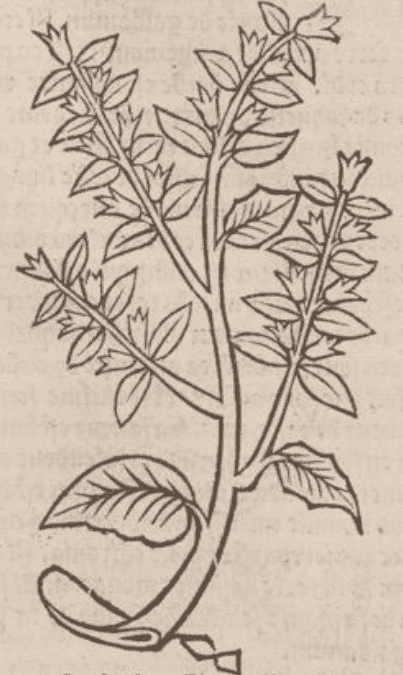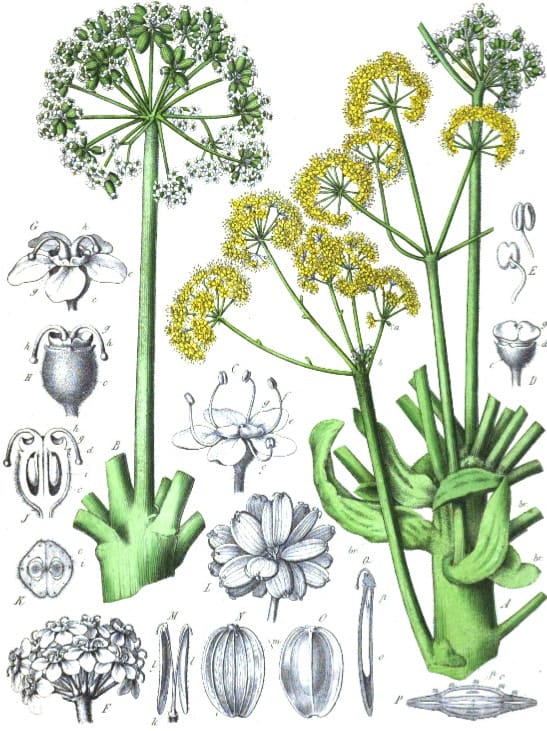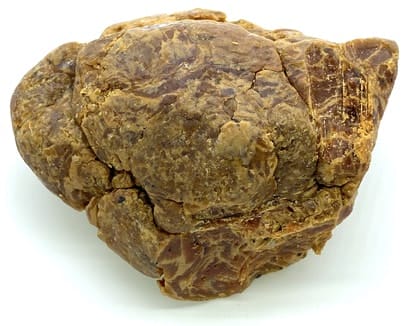Assafoetida, Asafetida, A Wei 阿魏AsafoetidaHing, Hingu (Ayurveda) A Wei 阿魏 (TCM) Hilteet (Unani) Shing kun ཤིང་ཀུན (Tibetan) |

|
 Ortus sanitatis, Cube, Johann von, 1501
Ortus sanitatis, Cube, Johann von, 1501 Atlas der officinellen pflanzen (2), Felix, 1899
Atlas der officinellen pflanzen (2), Felix, 1899 Lump of raw Asafetida gum
Lump of raw Asafetida gum(Adam, 2022)
 Members CLICK HERE for the PRO VERSION
Members CLICK HERE for the PRO VERSIONBotanical name:
Ferula asafetida
Other related sources include F. sinkiangensis
Parts used:
Gum
‘The root has similar therapeutic functions’ (Li Shi Zhen)
Temperature & Taste:
Hot, dry. Pungent, bitter.
Classification:
2H. CARMINATIVES 2K. RESOLVENT 2Q. ANODYNE
3G. EMMENAGOGUE 3K. EXPECTORANT
4j. NERVINES
TCM:
J. Regulate Qi O. Promotes Digestion
Uses:
1. Warms the Womb, Moves Qi and Blood (West, Ayurveda):
-painful and difficult Menstruation
-chiefly for Suffocation of the Uterus: Hysteria and PMS
-“Dissolves the coagulated blood in the abdominal cavity” (Avicenna)
2. Warms the Stomach, Benefits Digestion (West, TCM, Ayurveda, Tibetan):
-indigestion, colic, abdominal pain, poor appetite
-taken before meals to strengthen a weak stomach
-Food Stagnation
-‘dissolves indigestion due to overeating of meat’. (Zhu Zhen Heng)
3. Clears Wind, Stops Spasms (West, Tibetan):
-good for Wind diseases from Wind-Phlegm / Wind-Damp
-Spasms, Convulsions, Epilepsy, Neurasthenia, Nervous Prostration, Depression, Insanity
-“Its actions in Epilepsy resemble those of Peony”. (Avicenna)
4. Warms the Kidneys (West, TCM, Ayurveda, Tibetan):
-Impotence, Premature Ejaculation, Spermatorrhea
-Arthritis, Edema (Tibetan Medicine)
5. Clears Cold Phlegm, Stops Cough (West, Ayurveda, Tibetan):
-spasmodic Cough, Asthma, chronic Bronchitis, Whooping Cough, Peri-pneumonia
-internal Abscesses (Avicenna)
-‘useful in internal tumours’ (Avicenna)
6. Clears Wind, Resists Poison (West, TCM, Ayurveda, Tibetan):
-used since ancient times as an antidote to Evil, Infectious and Epidemic diseases
-effective to prevent and treat Influenza; also Malaria
-“applied on bite of Rabid Dog as also on Insect stings particularly that of the Scorpion and Tarantula”. (Avicenna)
-‘disperses invading pathogenic Wind’ (Li Xun)
-antidote to Aconite and Opium poisoning; also other Poisons
-‘detoxifies toxin of all kinds of mushrooms and vegetables’. (Da Ming)
7. Kills Worms:
-used for Worms
–Gu syndrome (diseases caused by Parasites) (TCM)
8. Externally:
-Vulnerary; used for Wounds, Bruises
-externally for swelling of the Spleen, ‘suffocation of the Uterus’
-fumes of Asafetida and Goat’s horn, being burnt, was inhaled for Epilepsy
-smoke inhaled for Rhinitis and Sinusitis
-a small piece wrapped in linen or gauze can be put into the ear before sleep for Tinnitus.
-“Used as a kohl (collyrium) with honey, it proves beneficial in early stages of Cataract”. (Avicenna)
-“Corroded molars are filled with Asafetida or it is pasted with Frankincense on the teeth” (Avicenna)
-“Malignant necrotic swellings are scarified and asafetida is applied thereon with good results.” (Avicenna)
-“It is also a good remedy for the external and internal Abscesses”. (Avicenna)
Dose:
… available in PRO version
Correctives:
… available in PRO version
Substitute:
… available in PRO version
Preparation:
… available in PRO version

Main Combinations:
1. To promote Menstruation, cleanse the Uterus, to promote Labor, and for Hysteria;
i. Asafetida with … available in PRO version
ii. Asafetida with … available in PRO version
iii. Asafetida with … available in PRO version
iv. Asafetida with … available in PRO version
v. Asafetida with … available in PRO version
vi. Asafetida, … available in PRO version
2. Hysteria:
i. Asafetida with … available in PRO version
ii. Asafetida … available in PRO version
iii. Asafetida with … available in PRO version
iv. Asafetida with … available in PRO version
v. and to strongly promote Menstruation, combine Asafetida with … available in PRO version
vi. Asafetida with … available in PRO version
vii. Asafetida with … available in PRO version
viii. Asafetida, … available in PRO version
3. Infertility, Asafetida with … available in PRO version
4. Asthma or Bronchitis:
i. combine Asafetida with … available in PRO version
ii. Asafetida with … available in PRO version
iii. spasmodic Cough, Whopping Cough, Asafetida, … available in PRO version
5. Wind diseases: combine Asafetida with … available in PRO version
6. Epilepsy, Seizures:
i. Asafetida with … available in PRO version
ii. Asafetida with … available in PRO version
7. Nervous diseases, Spasms:
i. Neurosis, Asafetida with … available in PRO version
ii. Asafetida with … available in PRO version
iii. Asafetida with … available in PRO version
8. Hypochondriac Melancholy, Asafetida with … available in PRO version
9. Abdominal Obstruction, Asafetida, … available in PRO version
10. To promote Digestion and increase digestive Heat, Asafetida with … available in PRO version
11. All Wind diseases of the digestive system: combine Asafetida with … available in PRO version
12. Heart disorders from Wind, Heart pain, Asafetida, … available in PRO version
13. Diarrhea associated with weakness of the Stomach, combine Asafetida with … available in PRO version
14. Dysentery, Asafetida, … available in PRO version
15. Chronic Malaria, Asafetida with … available in PRO version
16. Abscesses, Carbuncles etc., combine Asafetida with … available in PRO version
17. In enemas, Asafetida with … available in PRO version
Major Formulas
Asafetida 25 (Shin kun nyer lnga) (Tibetan Medicine)
Mental Happiness (Sems kyi bde skyid) (Tibetan Medicine)
Cautions:
1. Best not used during pregnancy (despite having been used for Threatened Miscarriage)
2. Not used in Heat conditions.
Toxicity:
1. Evaluation of Toxicity Effects of Asafetida on Biochemical, Hematological, and Histological Parameters in Male Wistar Rats
2. Acute and subchronic toxicity assessment model of Ferula assa-foetida gum in rodents
3. . Sub-acute and acute toxicity of Ferula asafoetida and Silybum marianum formulation and effect of the formulation on delaying gastric emptying
4. Severe Methemoglobinemia Secondary to Ferula asafoetida Ingestion in an Infant: A Case Report
Main Preparations used:
Pills of Asafetida (either alone, made up with Distilled Vinegar, or Compound)
Click the Tabs above for more information on this Medicin
|
‘Whether the substance which the ancients called Laser was the same as the modern Aasafoetida, is a question that has been often discussed during the last three hundred years, and it is one upon which we shall attempt to offer no further evidence. Suffice it to say that Laser is mentioned along with products of India and Persia, among the articles on which duty was levied at the Roman custom house of Alexandria in the 2nd century. “Hingu,” doubtless meaning Asafoetida, occurs in many Sanskrit works, especially in epic poetry, but also in Susruta. Asafoetida was certainly known to the Arabian and Persian geographers and travellers of the middle ages. One of these, Ali Istakhri, a native of Istakir, the ancient Persepolis, who lived in the 10th century, states that it produced abundantly in the desert between Sistan and Makran, and is much used by the people as a condi-ment. The region in question comprises a portion of Beluchistan. The geographer Edrisi, who wrote about the middle |
of the 12th century, asserts that asafoetida, called in Arabic Hiltit, is collected largely in a district of Afghanistan near Kaleh Bust, at the junction of the Helmand with the Arghundab, a locality still producing the drug. Other Arabian writers as quoted by Ibn Baytar, describe asafoetida in terms which show it to have been well known and much valued. Matthaeus Platearius, who flourished in the second half of the 12th century, mentions asafoetida in his work on simple medicines, known as Circa installs, which was held in great esteem during the middle ages. It is also named a little later by Otho of Cremona, who remarks that the more foetid the drug, the better its quality. Like other productions of the East, asafoetida found its way in European commerce during the middle ages through the trading cities of Italy. It is worthy of remark that it is much less frequently mentioned by the older writers than galbanum, sagapenum and opopanax. In the 13th century, the “Physicians of Myddfai,” in Wales, considered asafoetida as one of the substances which every physician “ought to know and use.” (Pharmacographia, Fluckiger & Hanbury, 1879) |
